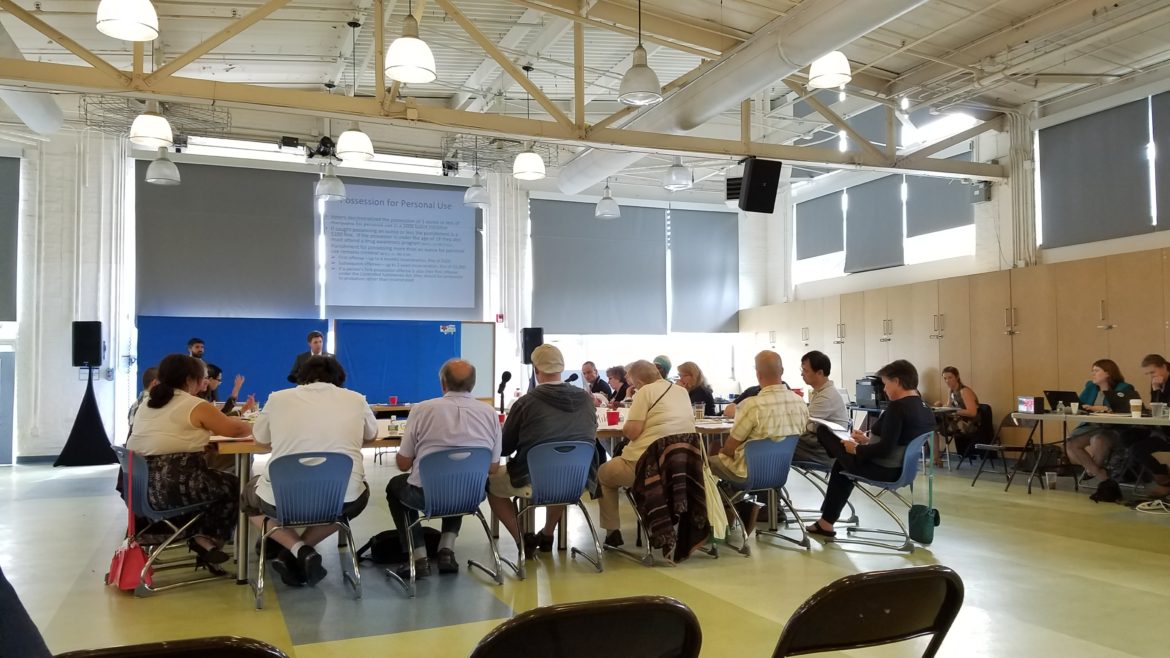
Charlie Breitrose
A group of 20 voters listen to presentation from those for and against Question 4, the ballot measure that would legalize the sale of marijuana in Massachusetts. The hearings are being held at the Atrium School in Watertown.
The ballot measure that has drawn the most attention and heated debate is being hashed out by a group of voters who gathered in Watertown this week, and in the end, they will come up with a statement about Question 4, the proposal to legalize the sale of marijuana.
On the first day of the four day process, the group of 20 voters chosen from around the state heard presentations about the current law, and from the Yes and No campaigns for Question 4. The group gathered at the Atrium School in Watertown, and the process, called the Citizens’ Initiative Review, is a pilot of a program that is supported by Watertown State Rep. Jonathan Hecht.
Current laws regarding marijuana are confusing. In Massachusetts it was decriminalized in 2008 and medical marijuana was legalized in 2012, however, in federal law it remains illegal, but is in Schedule 1, the lowest, least serious of the five federal categories.
Pros and Cons
The proponents of legalizing marijuana in Massachusetts said it helps give access to people who want to get it for medical reasons, will bring revenue to the state, will help cut the number of people addicted to opioids and will fix “unfair” drug laws that disproportionately impact African-Americans and other minorities.
The opponents say the ballot question was written by the marijuana industry, is worse than those approved in other states and will result in increased use by teens, more OUIs and will not bring in much money to the state.
Jim Borghesani, spokesman fro the Yes on 4 campaign, said the ballot measure would not legalize smoking marijuana in public. Will Luzier, the campaign manager for Yes on 4 said it will make it more difficult for minors to get their hands on marijuana.
“Eighty percent of high school students say it is easy to get marijuana, easier than getting alcohol. People selling marijuana don’t ask them for their ID,” said Luzier, a former assistant Attorney General in Massachusetts.
The opponents, known as the Campaign for a Safe and Healthy Massachusetts, responded that other surveys found that marijuana use for 12-17 year olds is up in states with legalized marijuana, said Kevin Sabet, who worked for the Obama Administrations’ Office of National Drug Control Policy and runs the Smart Approaches to Marijuana group.
Sabet added that arrests for driving under the influence (OUI) in Washington state jumped after legalization. Borghesani said that in Colorado, OUIs have remained level since legalization.
In Colorado, one of the first states to legalize marijuana, the state got $113 million in revenue last year, Borghesani said.
Hannah Kane, a State Representative from Shrewsbury who is on the No campaign, said that Massachusetts will not fare as well because the tax rate would be much lower. In Massachusetts the marijuana tax will be 10 percent with a 2 percent local option tax, while in Colorado the tax rate is 25 percent and 37 percent in Washington.
“The marijuana industry were the ones at the table when the ballot question was written,” Kane said.
Borghesani, who was the head of communications for the governor and the Suffolk County District Attorney’s office, said the number of opioid overdoses were reduced by nearly 25 percent in states where marijuana is legal.
Colorado has the highest levels of use of drugs including marijuana and opioids, Sabet said.
While towns can choose to not allow stores that sell marijuana, Kane said in other states, it was an opt-in choice, but in Massachusetts communities would have to opt out with a town-wide vote.
More Testimony
The Pro and Con presentations are just the start for the group of voters weighing the ballot measure. They will also hear from experts in the fields of health, law, finance and from people from states that have legalized marijuana.
On Sunday, after three days of hearing presentations, the group will write a statement. This would be included in the voter guide if the process is approved by the Legislature.
This statement the most important results of the CIR process, Hecht said, instead of relying on advertising from either side of the issue.
“In the guide that comes from the Secretary of State, a lot of it is either the spin of the Pro and Con side, or dry legalize that doesn’t help voters really get information,” Hecht said.
Hecht decided to push for this effort, which has been successful in other states, including Oregon, because of the ballot question process in Massachusetts.
“There are more and more ballot measures each year and more important issues being decided on ballots,” Hecht said.
Hecht proposed making such voter panels part of the ballot question process in the legislature this year, but it did not get to a vote. He decided to go ahead with a pilot project, and a panel of politicians, academics and others picked the marijuana initiative over the other ballot questions.
The group of voters will continue to hear testimony through the weekend, and the public can come and watch. See the schedule and more information here.